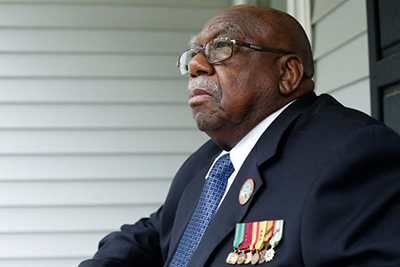By Melissa Brown Nashville Tennessean
(Source: Tennessean)
Charles Person, the youngest member of the original Freedom Riders who faced racial violence to challenge segregation in interstate travel, died on Wednesday in Fayetteville, Georgia. He was 82.
In 1961, 18-year-old Person joined a group of 12 other Civil Rights activists, both Black and white, to travel by bus into the Deep South.
A recent Supreme Court ruling had outlawed racial segregation in public transportation, but the South was holding fast to illegal Jim Crow practices. The trip’s aim was to “test” facilities like waiting rooms and bus depot restaurants on a route down to New Orleans. The group would pair a white Rider and Black rider together and have them try the facilities at stops along the route.
The Morehouse College freshman had first become involved in Civil Rights protests in Atlanta during lunch counter sit-ins when he caught wind of the bus trip. In a 2021 interview with the USA TODAY Network, Person recalled his slight figure – 5 feet 6 inches and 126 pounds – and said he was recruited for his “squeaky clean” image.
The Riders were trained in non-violence tactics before beginning their trip. The trip, which would send the small group of Freedom Riders into hostile and often isolated territory, was considered so dangerous by some prominent Civil Rights leaders at the time that the Riders were warned against departing.
“I probably should have been afraid, you know,” Person recalled in 2021. “I probably should have been afraid, but, you know, the movement was bigger than I was. It was not about me.”
Person and the original Freedom Riders were met with violent resistance in Alabama on May 14, 1961. One bus was firebombed in Anniston, Alabama, by a white mob. Person, who was riding on a second bus, was beaten alongside two others in Anniston when they refused to go to the back of the bus. The group later encountered a violent Ku Klux Klan mob in Birmingham, Alabama.
Several Riders were seriously injured, and media reports of the attacks spread quickly. Alabama Gov. John Patterson refused to guarantee state protection if the group continued on their route to New Orleans, and a bus driver boycott forced the Freedom Riders to fly to New Orleans.
But the news and images of the Alabama attacks, including a single photo from the Birmingham bus station melee that pictured a dozen men attacking Person on the ground, inspired a new movement of activists.
Groups of young activists poured into Mississippi and Alabama over the summer of 1961, eventually pressuring national authorities to enforce the integration law across the South.
“As a group, we wanted to continue the rides. It gave us a great solace to know that these young people were going to take up the mantle,” Person said. “They knew they were either going to get beat up or their bus burned. They knew that something was going to happen to them. And yet, they came.”
Birmingham Mayor Randall Woodfin, a Morehouse alumnus, called Person a “giant in the civil rights movement.”
“His legacy will always be defined by his immeasurable courage,” Woodfin said in a statement. “He stood firm so that we may be able to experience the joys of freedom. Rest well.”
The Rev. Al Sharpton said Monday Person and his fellow Riders “tore down the walls of segregation.”
“Person was an American hero that changed this country, in his name we must fight to not allow the country to retreat in any way toward the rights gained with the bloodshed of the Freedom Riders,” Sharpton said. “We owe to Person to continue that fight, so he can rest in the peace that we will not let this country erase the progress and tangible change we enjoyed because Person and the Freedom Riders withstood assaults, threats and even death to give to us.”
When Person returned home to Atlanta after the trip to New Orleans, his mother urged him to join the military, feeling he would be safer there than in the Civil Rights Movement. He served in the Vietnam War and retired from the U.S. Marine Corps in 1981.
“He always focused on equality and justice in the world,” his wife, Jo Etta Person, said in an interview Monday.
He later worked with Atlanta Public Schools as an electronics technician.
His daughter Keisha Person said in an interview Monday her dad didn’t always talk about his time as a Freedom Rider, and she didn’t even know his role in the movement until the family took a trip to the Birmingham Civil Rights Museum when she was 10. As he later opened up about it, he would come to speak to her classes about his experience and how he “paved the way for us.”
“He encouraged us to pave the way for the next generation,” Keisha Person said.
Person always counseled his kids to stand up for what is right, Keisha Person said, and would tell them, “If you want to see change, it starts with you.”
In recent years, Person worked to co-found the Freedom Riders Training Academy in Anniston, Alabama, to develop a curriculum in civic engagement and nonviolent resistance. He also published a memoir, “Buses Are a Comin’, in 2021.
“The young people need to understand what happened,” Person said. “The freedoms we enjoyed did not happen overnight. A lot of people suffered. A lot of people sacrificed.”
With Person’s passing, Hank Thomas remains the last living original Freedom Rider.

